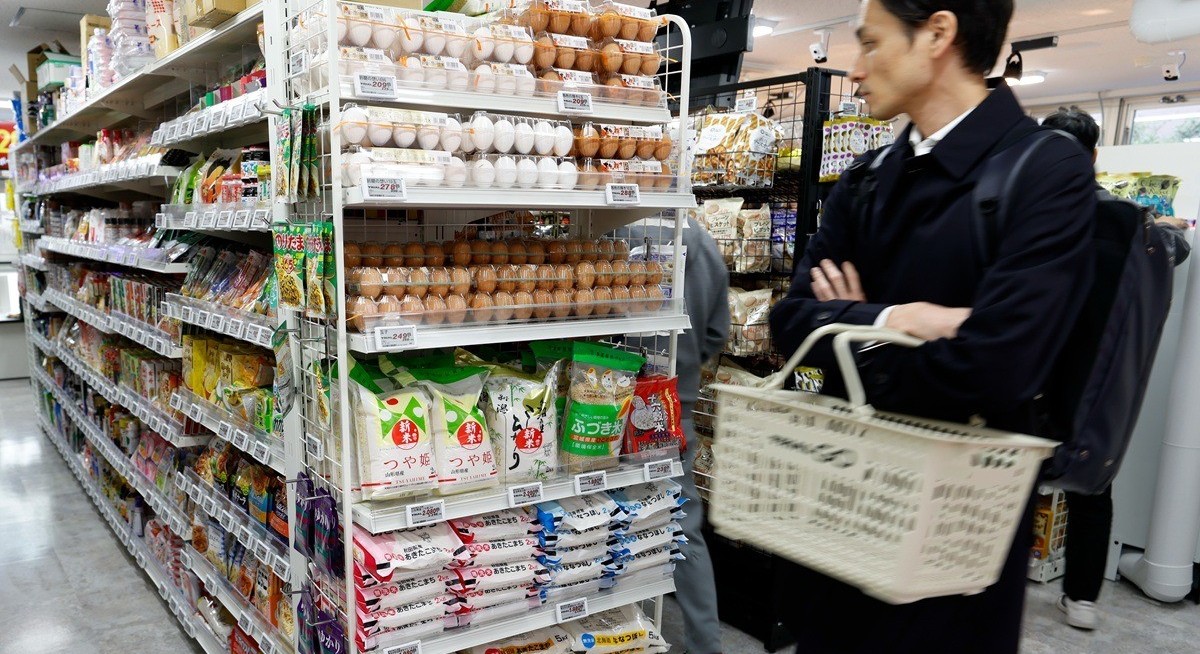The measure that also strips out energy also increased 2.8%, unchanged from last month. Service prices, a vital component to gauge the sustainability of inflation, increased 1.5% from a year earlier. Rice prices, a driving force for this year’s price gains, rose 37.9%, continuing to decelerate after the pace hit a record high of 93.8% in April.
The data, a leading indicator for national price trends, are likely to instill confidence in the BOJ that the probability of its economic outlook being realised is rising. The figures may give traders’ bets on a December interest rate hike another boost after such speculation mounted recently.
“Overall, there was nothing in today’s data to stop the BOJ from mulling a rate hike,” said Taro Saito, head of economic research at NLI Research Institute. “My base case is a hike in January but it will be determined after considering the yen and politics.”
What Bloomberg Economics says...
“Tokyo’s November CPI data show inflation remains sticky, supported by solid wage growth, stronger price expectations, and the rollback of energy subsidies. With Tokyo’s trend pointing to national inflation near 3%... the reading would bolster confidence that price growth is persistent enough to justify further scaling back stimulus as early as December.” — Taro Kimura, economist
See also: US changes India trade deal statement, sparking confusion
The yen was little changed around 156.25 to the dollar after the data, while stocks were narrowly mixed.
The high cost of living is a primary focus of Prime Minister Sanae Takaichi’s government. She unveiled her first economic package last week to tackle the problem. While gains in processed food slowed, the pace remained elevated at 6.5%. In addition to rice, chocolate and coffee contributed to gains.
The number of price increases by Japan’s major food companies is set to reach 20,609 this year, rising 64.6% from the previous year, Teikoku Databank reported Friday.
See also: Australia and EU enter final stretch in long-running trade talks
In other data Friday, industrial production rose 1.4% in October from September, beating the consensus estimate of a 0.6% decline, while rising 1.5% from a year earlier, the Ministry of Economy, Trade and Industry reported. Car production rebounded as the US-Japan trade deal cut auto tariffs to 15% from 27.5%, while artificial intelligence (AI) demand gave a boost to information and communications equipment.
“The data suggest manufacturing is recovering from earlier US tariff hits,” said Taro Kimura, economist at Bloomberg Economics. “This reinforces the Bank of Japan’s assessment at its October meeting that downside risks to growth are easing.”
Separately, the jobless rate held steady at 2.6% and the jobs-to-applicant ratio nudged lower to 1.18 in October, meaning there were 118 jobs offered for every 100 applicants.
In an interview with Bloomberg this week, Tomoko Yoshino, the leader of Japan’s largest labor union group, urged Takaichi’s government to do more to fight inflation as the yen could help inflation continue to outpace nominal wage growth. Real wages have fallen for the last nine months. Yoshino’s group, Rengo, will be pushing for wage increases exceeding 5% in negotiations with employers that will culminate in March.
Takaichi unveiled an economic stimulus package last Friday with fresh spending totaling ¥17.7 trillion (US$113 billion, or S$146.58 billion), as she focuses on addressing rising costs of living with steps including expanded utility subsidies and a cut in gasoline taxes. SMBC Nikko Securities estimates the direct impact of those measures will shave 0.38 percentage point from Japan’s core CPI next year.
“Owing to government gasoline and utility measures, Japan’s inflation is going to decelerate quickly from here,” Saito said. “I expect Tokyo inflation to be around 2.5% in the next data, but that doesn’t mean the price trend will also be going down.”
The national key inflation gauge picked up to 3% last month, extending the streak of readings at or above the BOJ’s 2% target to more than three and a half years. Elevated costs of living were a primary reason that Takaichi’s ruling Liberal Democratic Party suffered setbacks in the last two national elections, losing majorities in both houses of parliament.
To stay ahead of Singapore and the region’s corporate and economic trends, click here for Latest Section
BOJ governor Kazuo Ueda has kept the benchmark rate at 0.5% since January, as he awaits more evidence that underlying inflation will achieve the 2% target. With the economy having escaped a devastating impact from US tariffs, as was once feared, almost all BOJ watchers expect a rate hike no later than January.
Kazuo Momma, former BOJ executive director in charge of monetary policy, told Bloomberg this week that the odds of a rate hike are “fairly high” at the December policy meeting, given the recent weakening of the yen. The central bank will deliver its next policy decision on Dec 19.
“Food inflation is expected to subside but a risk is the renewed weakening of the yen,” Saito said. “The yen could be boosting upside risks.”
Uploaded by Liza Shireen Koshy




